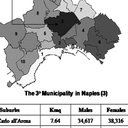N-benzyloxycarbonyl-L-proline: an in vitro and in vivo inhibitor of prolidase.
Słowa kluczowe
Abstrakcyjny
Prolidase deficiency (PD) is a recessive disorder of the connective tissue caused by mutations in the prolidase, a specific peptidase, cleaving the dipeptides with a C-terminal prolyl and hydroxyprolyl residue. PD is a complex syndrome characterized mainly by intractable skin lesions, recurrent respiratory infections and mental retardation. The relation between prolidase biological functions and the disease is still largely unknown. We studied the effect of a prolidase inhibitor, N-benzyloxycarbonyl-l-proline (Cbz-Pro), in vitro on prolidase from human fibroblasts and in vivo on murine erythrocytes prolidase. A 90% inhibition was detected incubating cellular extracts at 1:1 ratio of Gly-Pro substrate: Cbz-Pro inhibitor. Pulse experiments performed incubating human fibroblasts with 6 mM Cbz-Pro revealed that the inhibitor uptake was completed in about 1 min. The Cbz-Pro uptake was saturable and pH dependent. Long-term incubation of fibroblasts with Cbz-Pro caused mitochondria depolarization and increased cellular death as reported for long-term culture of fibroblasts from PD patients. An inhibitory effect of Cbz-Pro has also been shown in vivo. Our results demonstrated that Cbz-Pro is a potent inhibitor of prolidase in cultured fibroblasts and it can be used in vivo to better characterize the prolidase enzyme and further investigate PD physiopathology.


